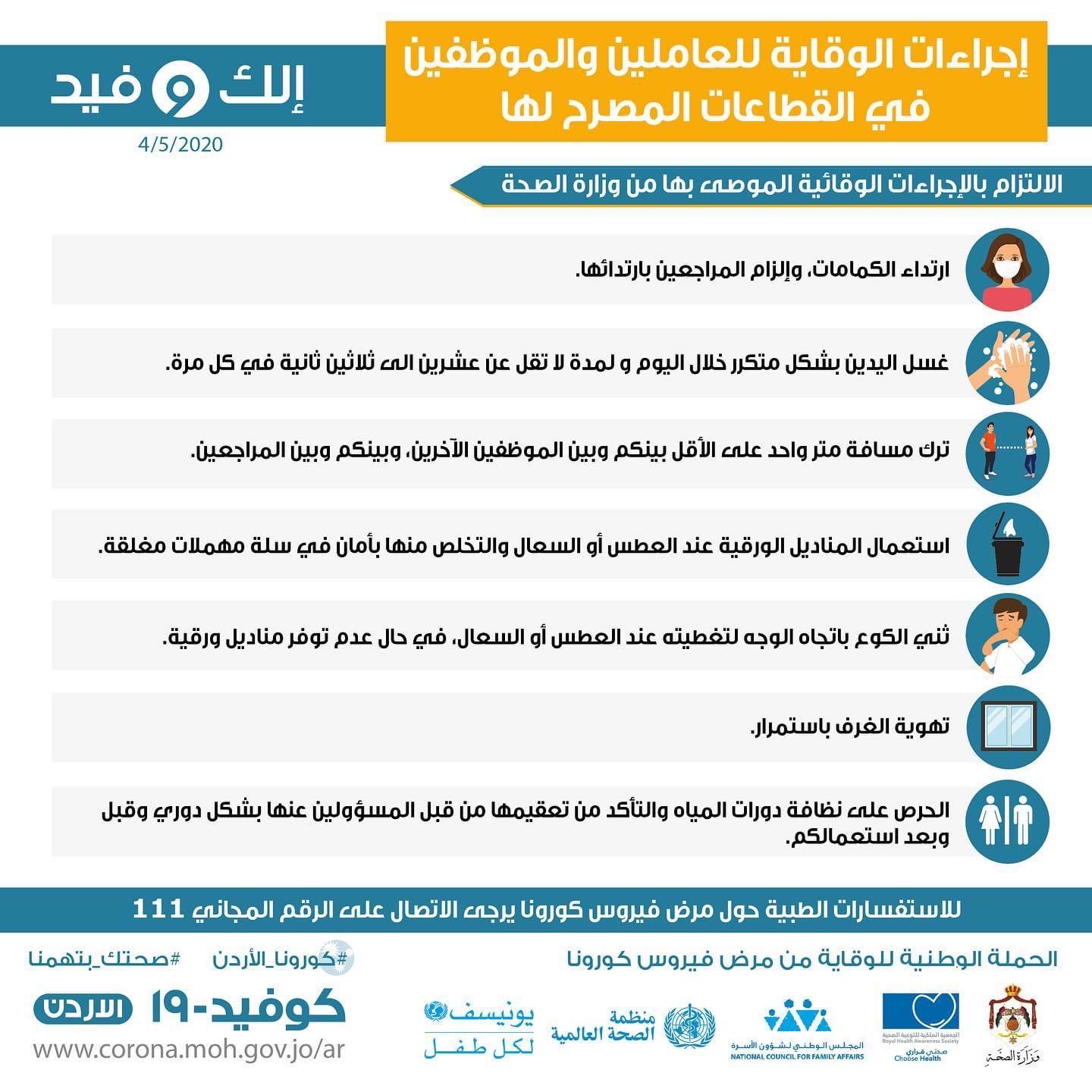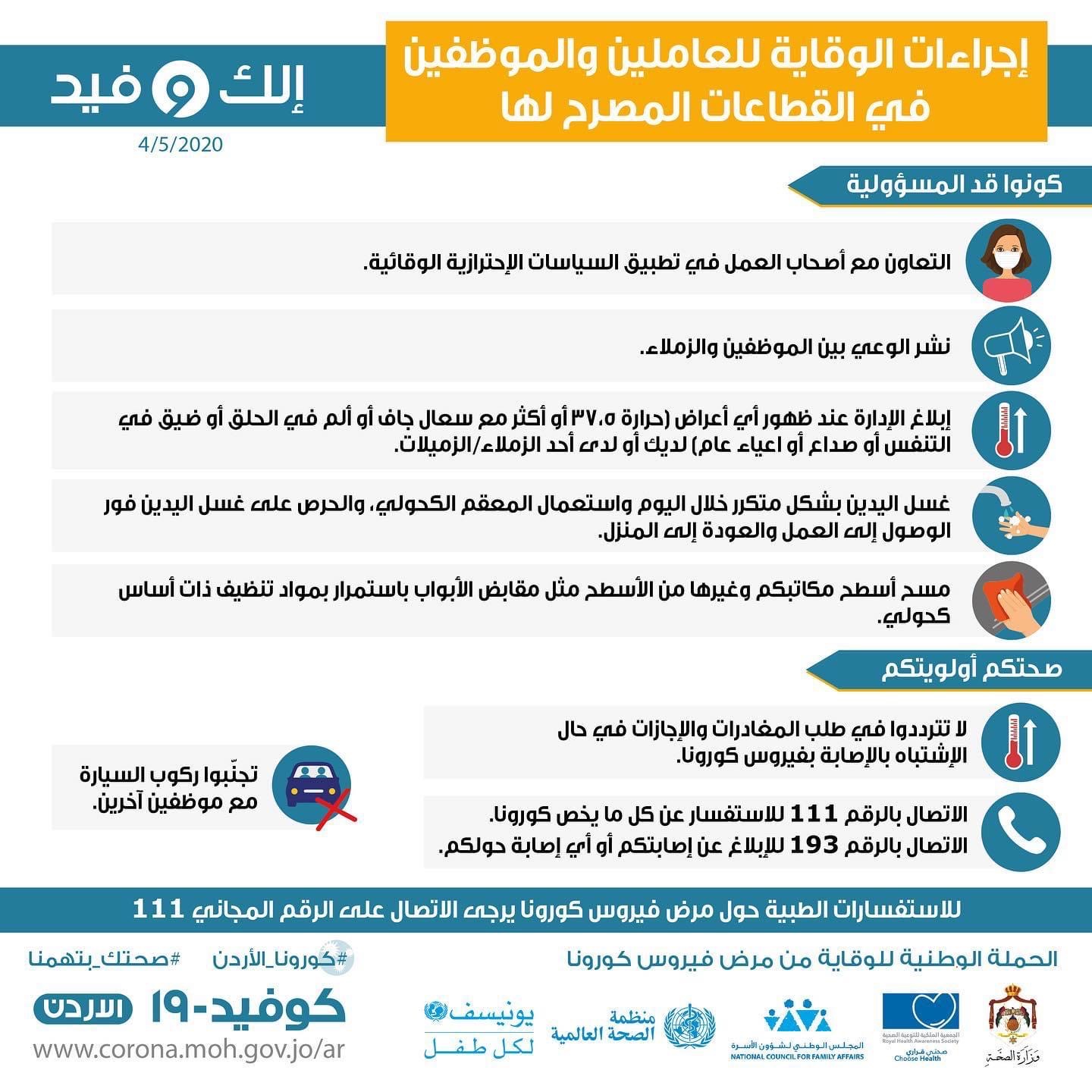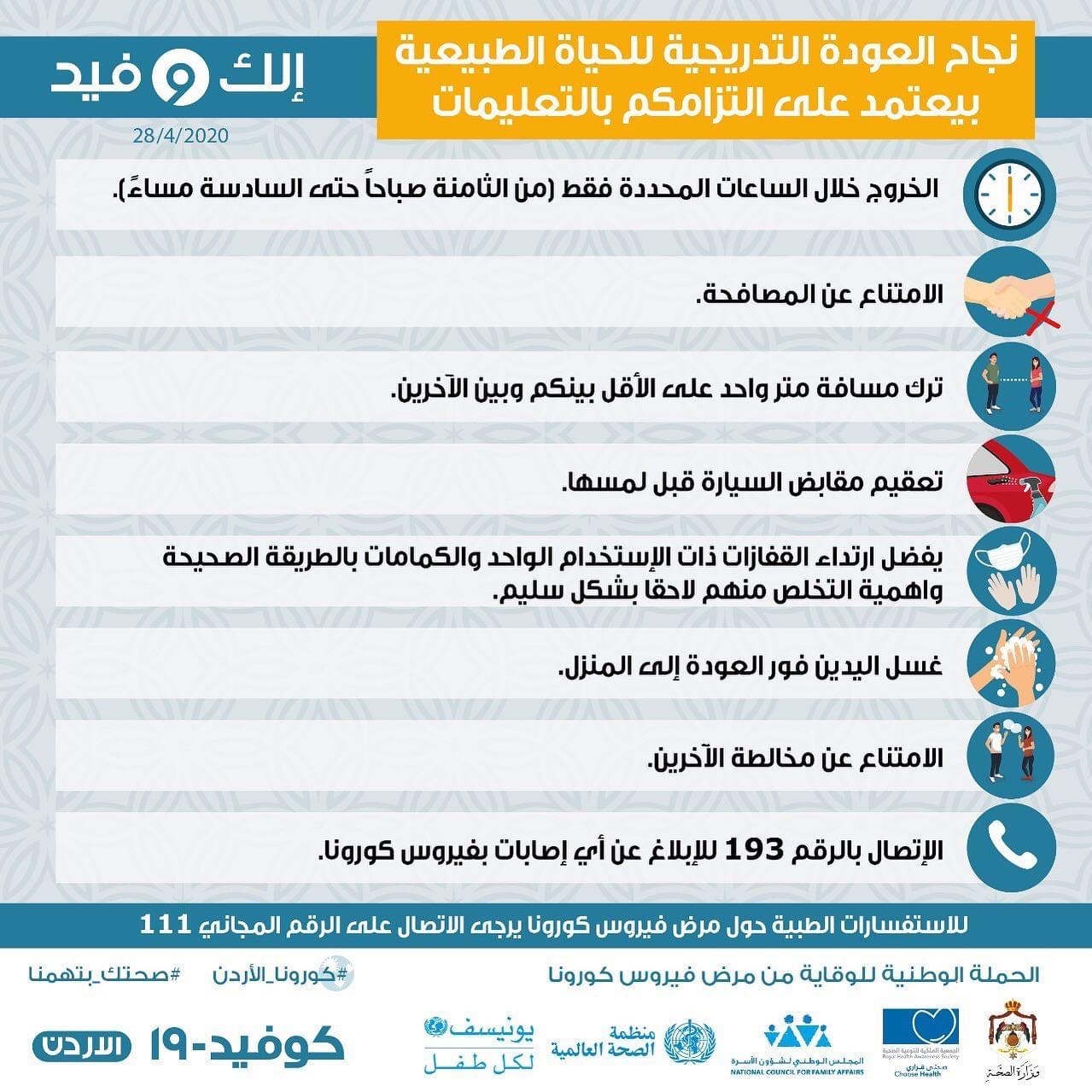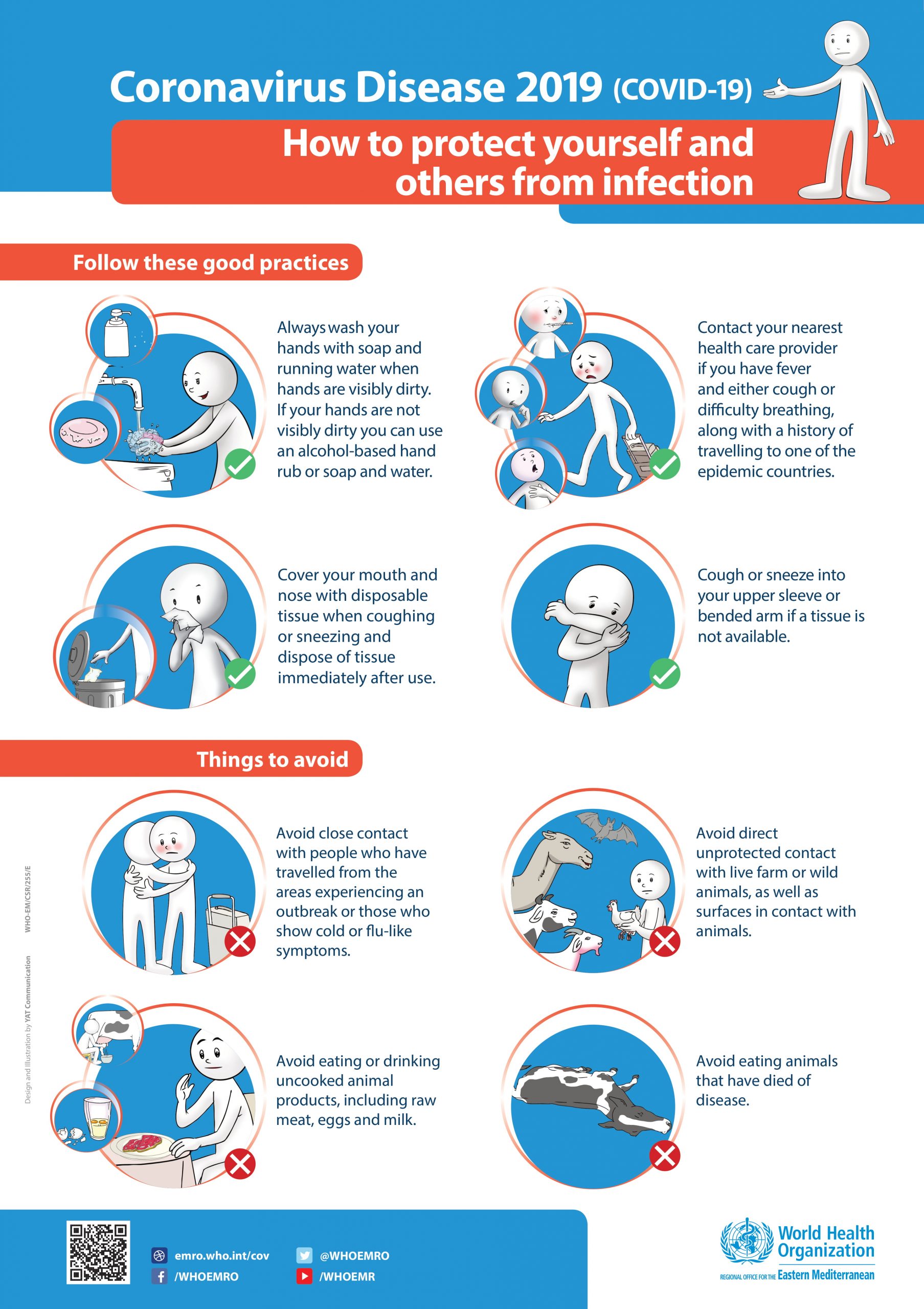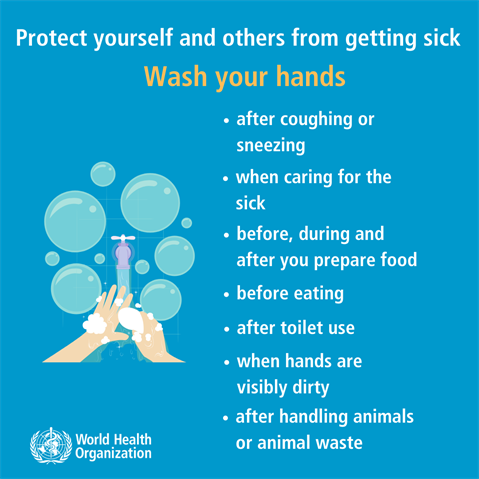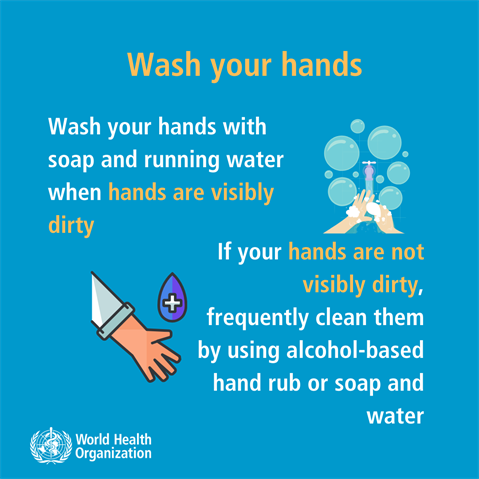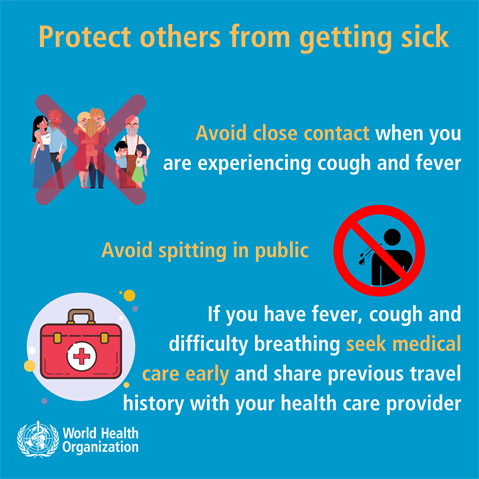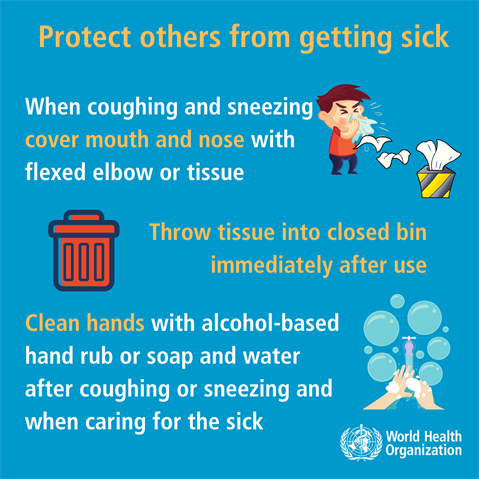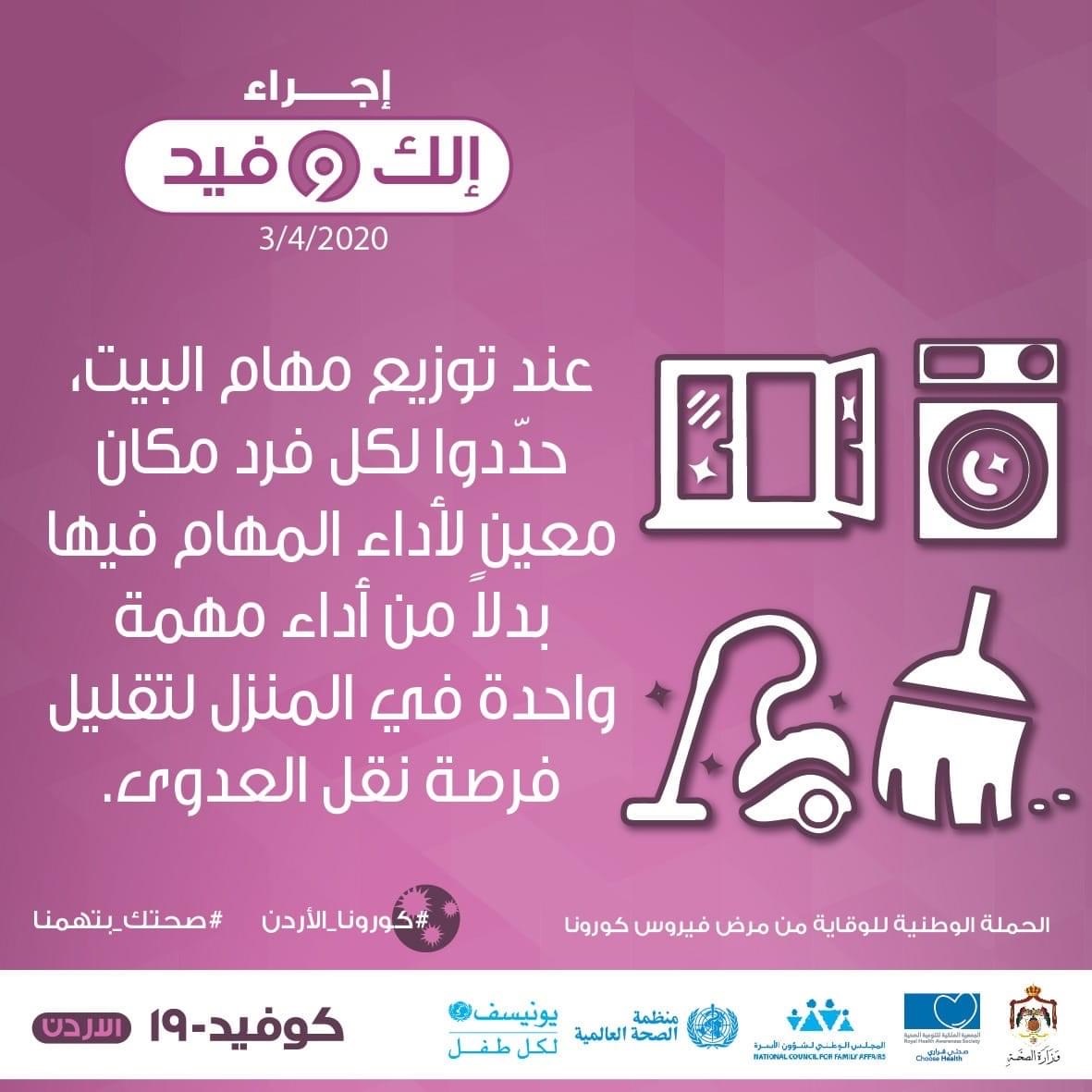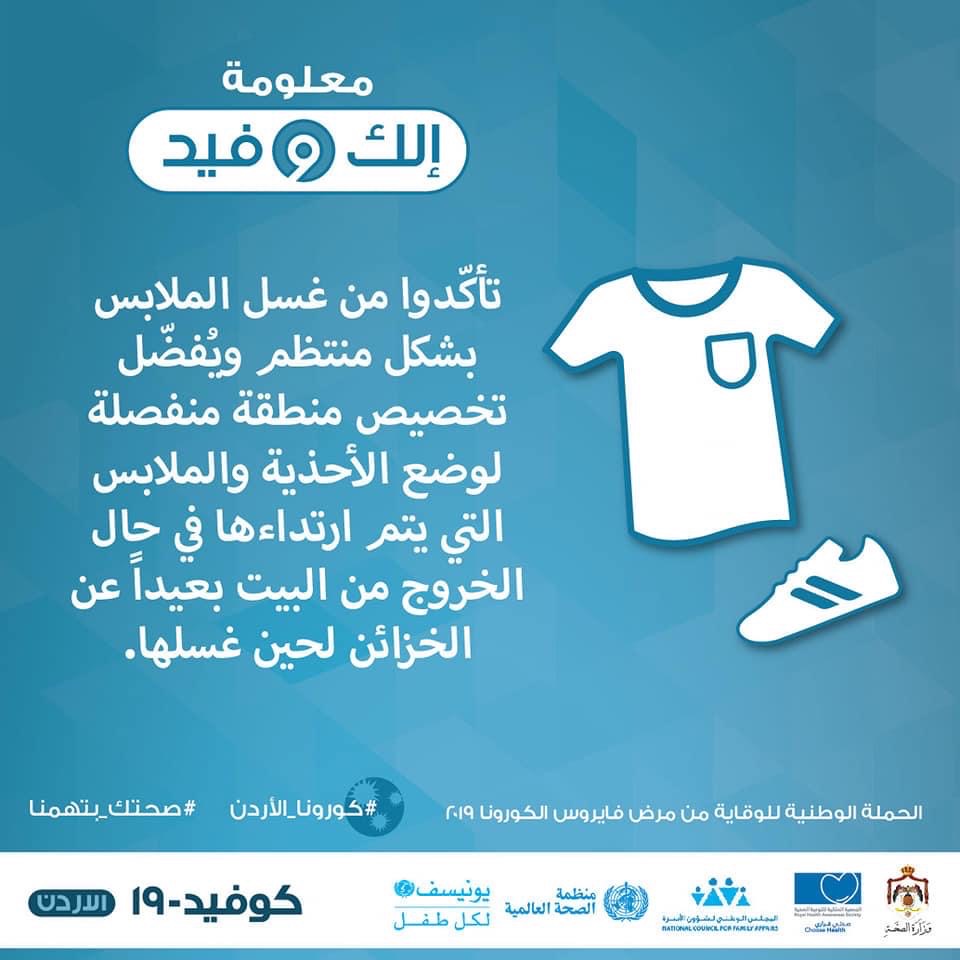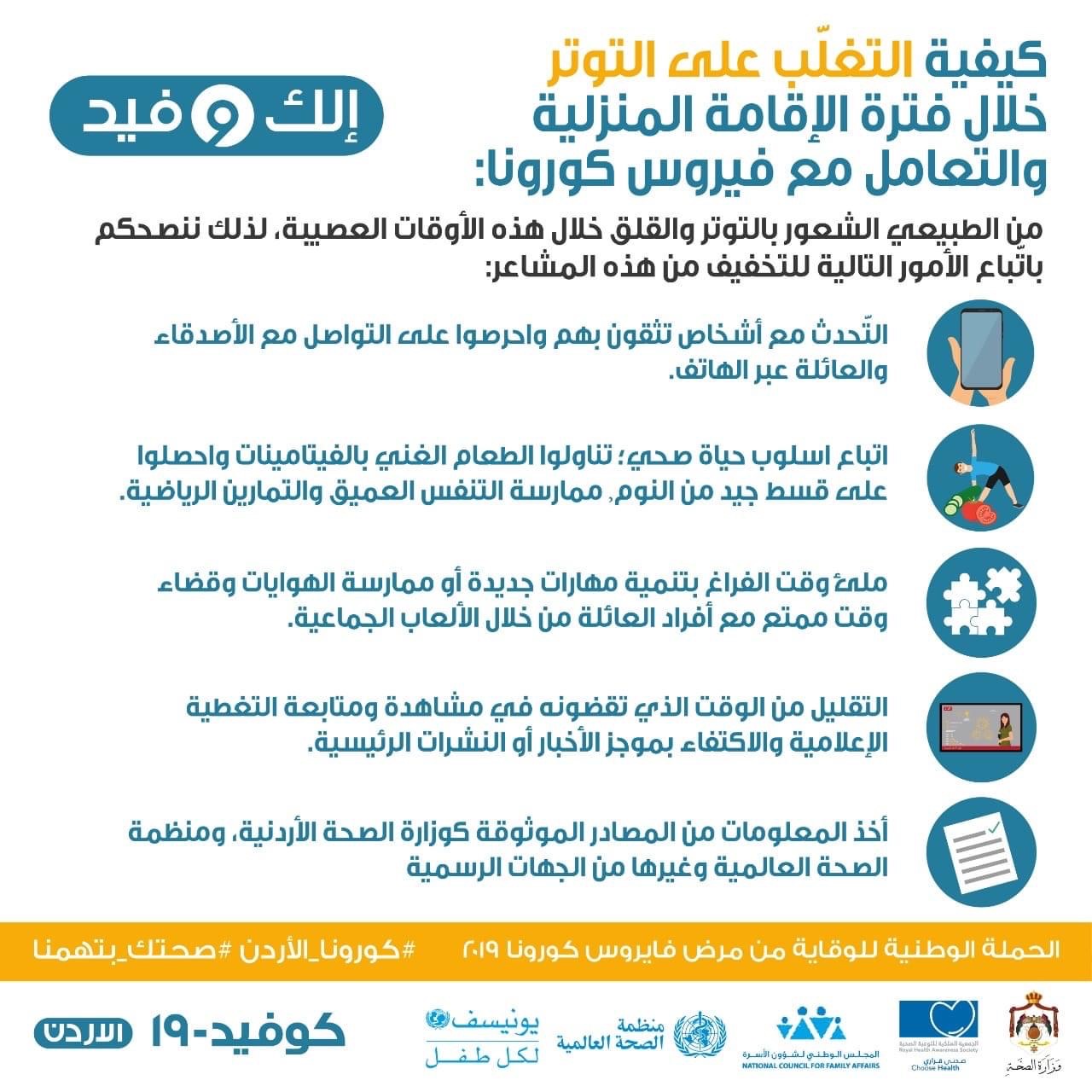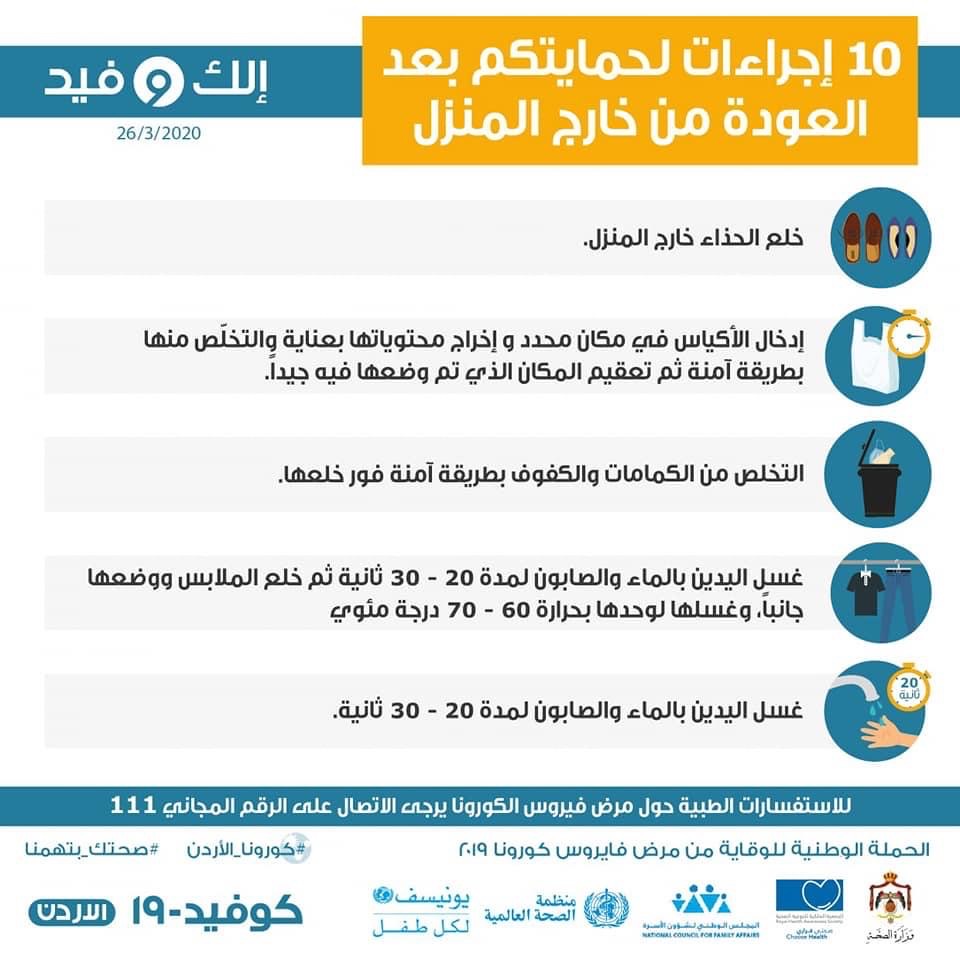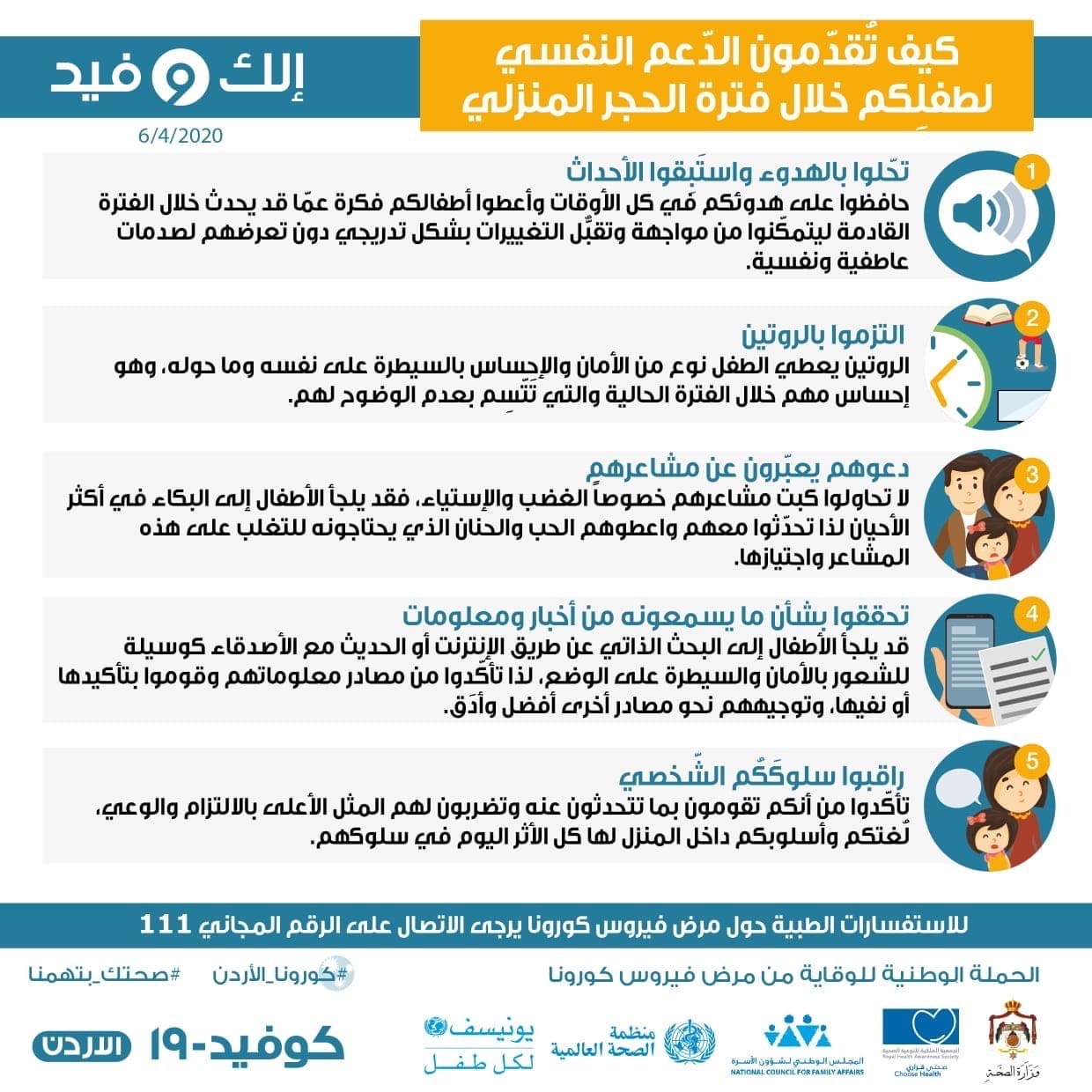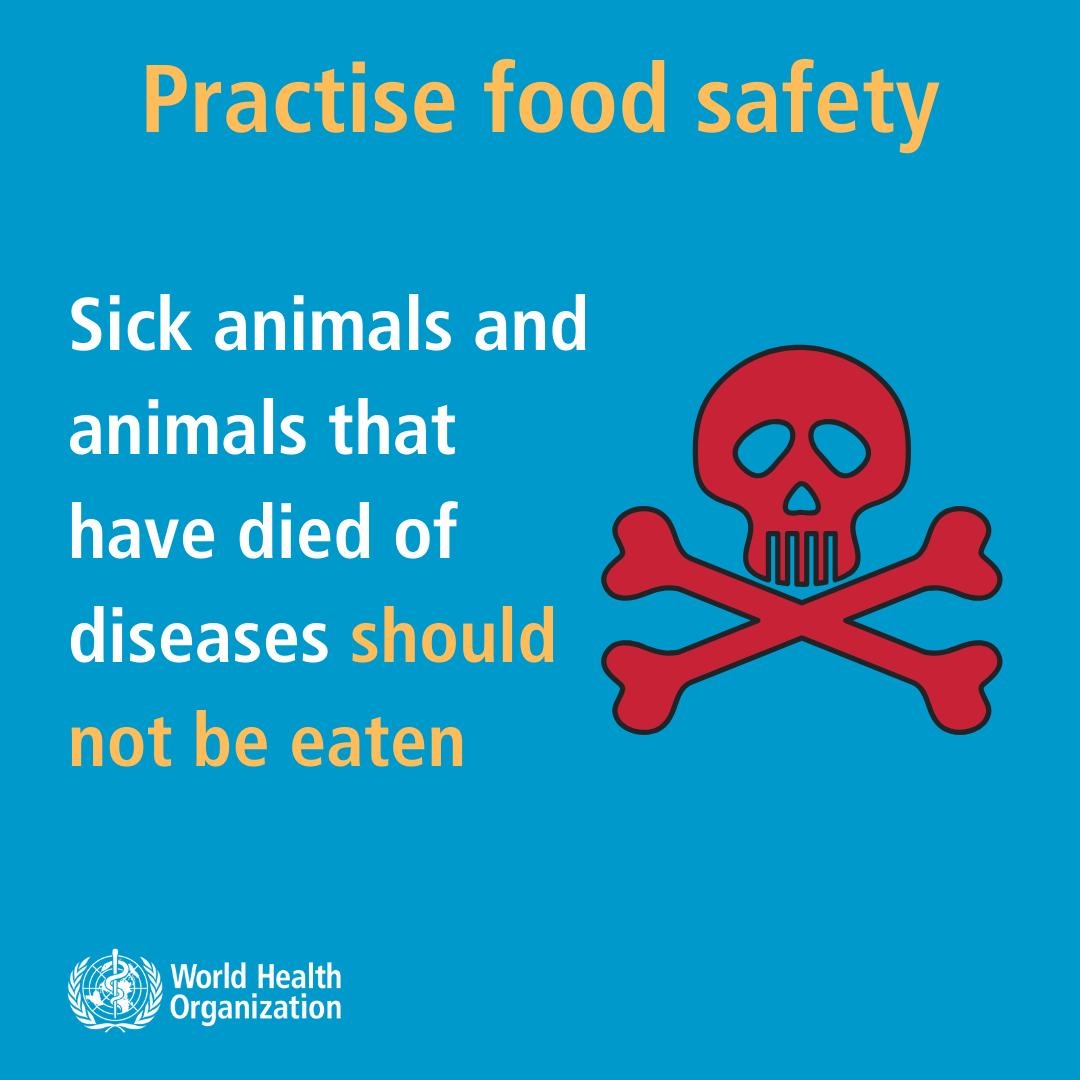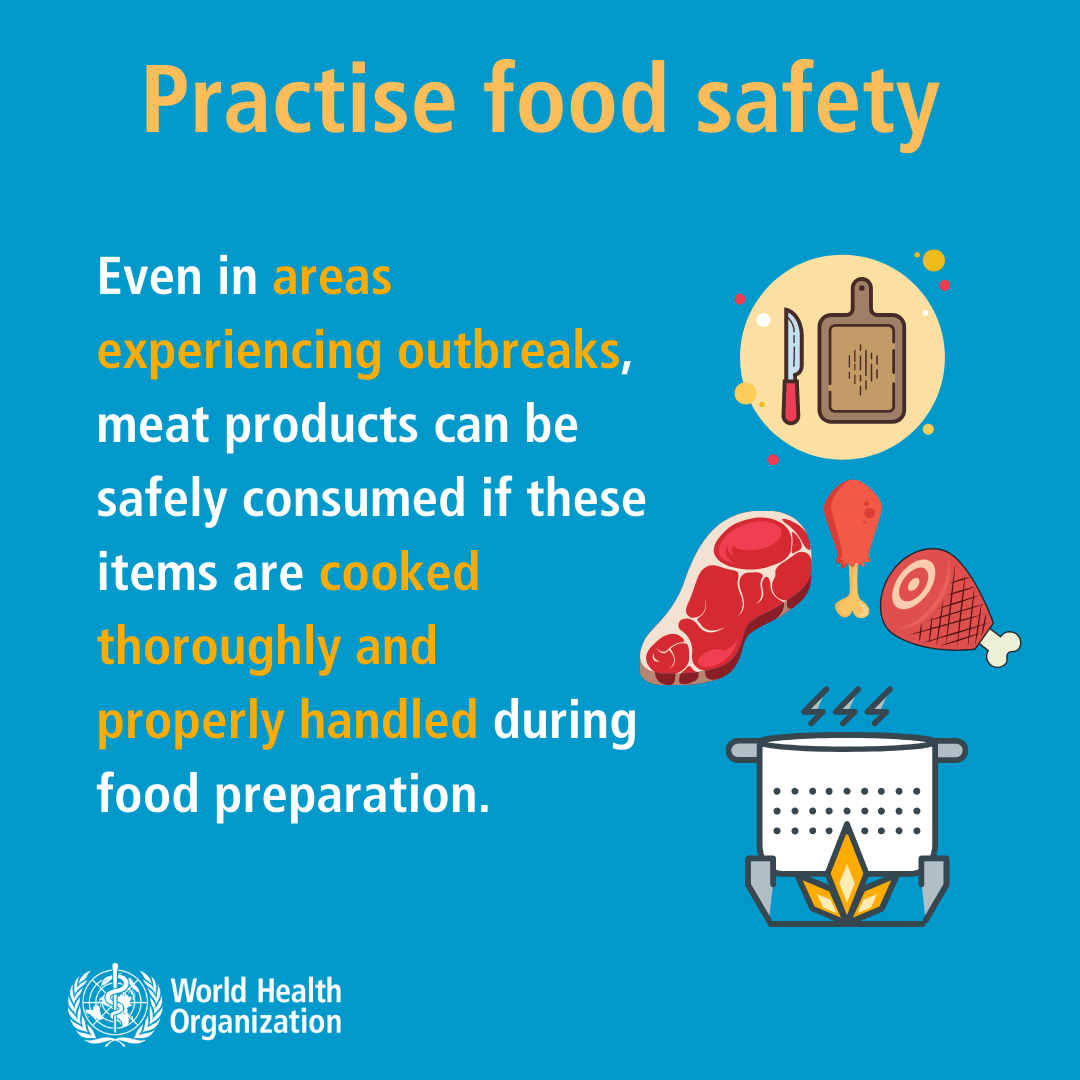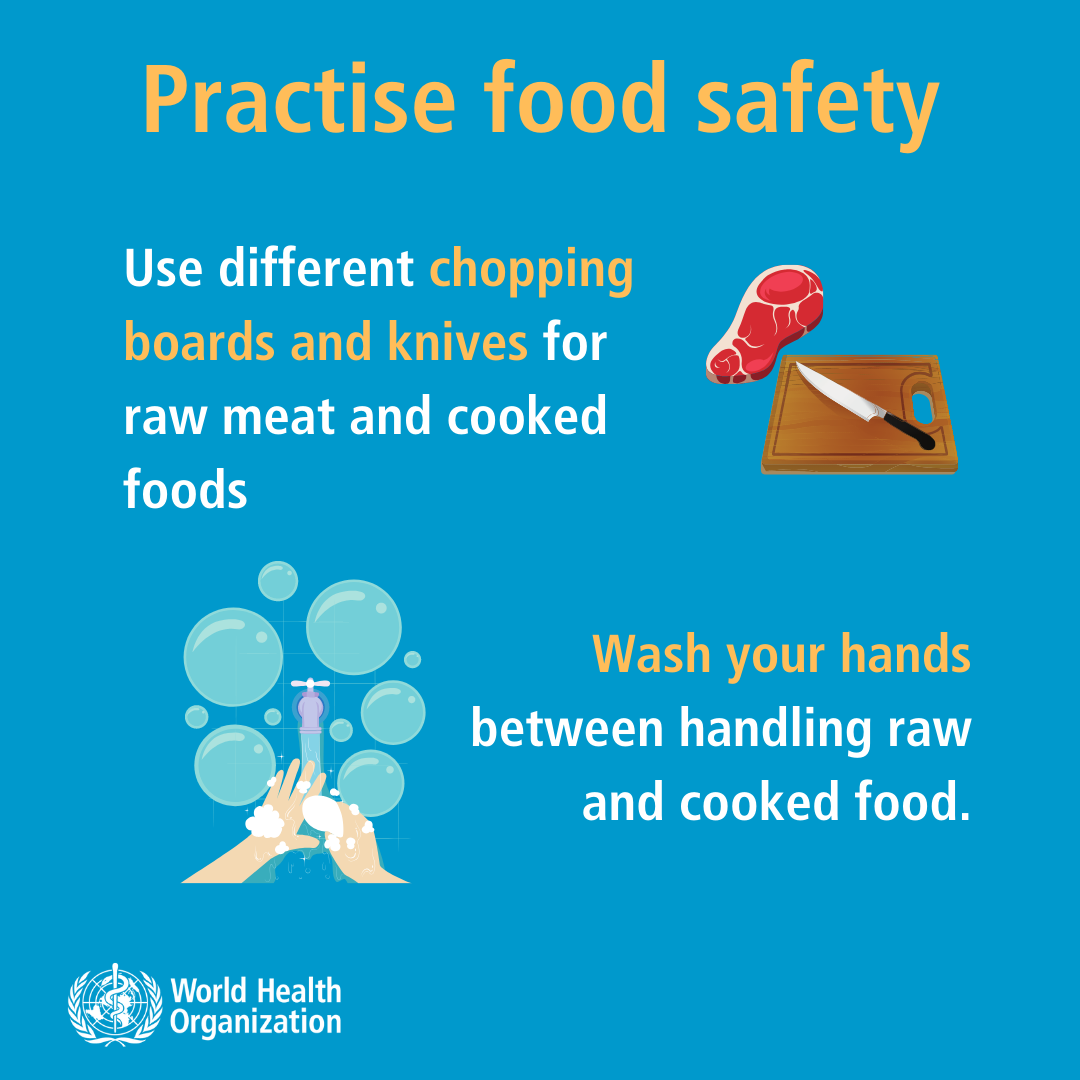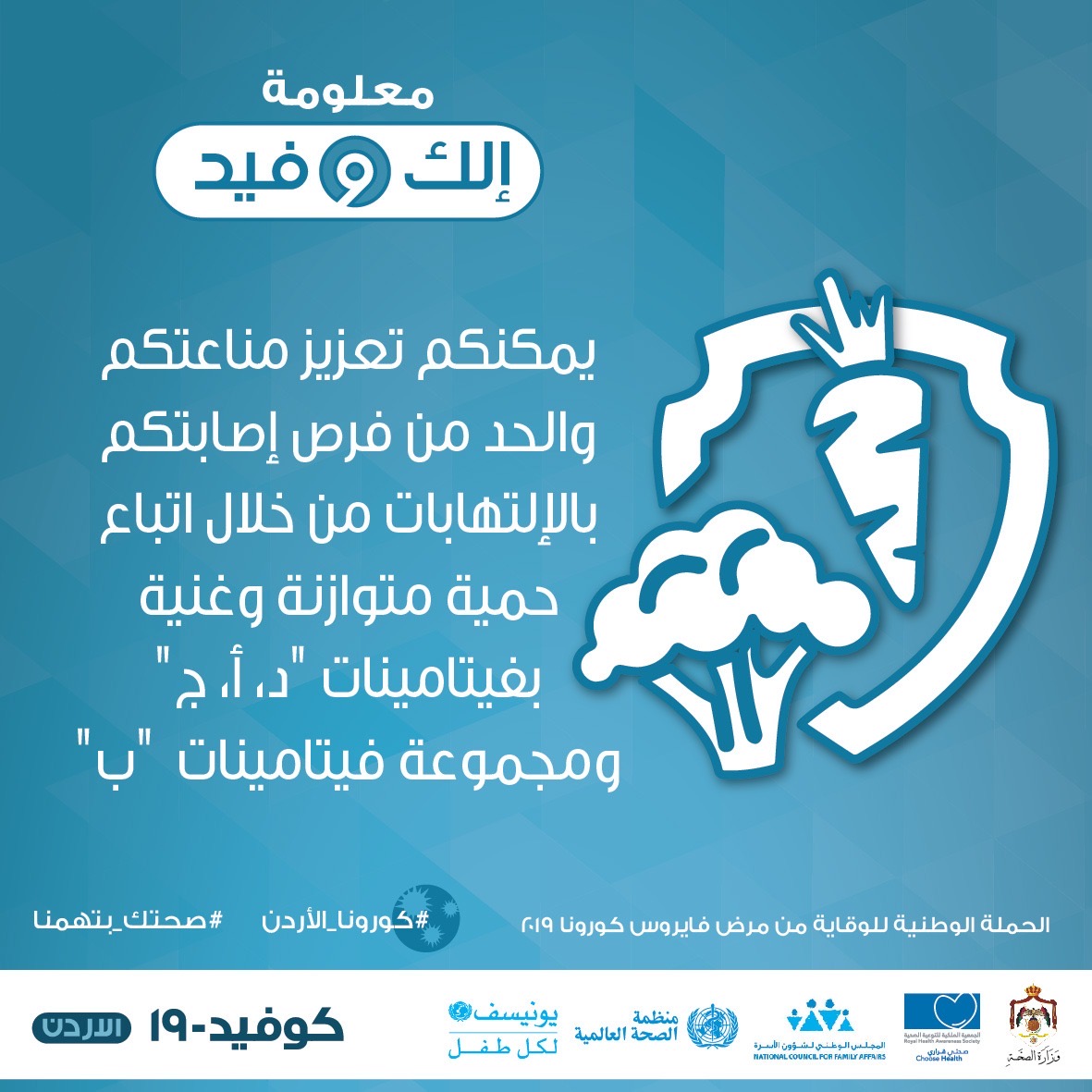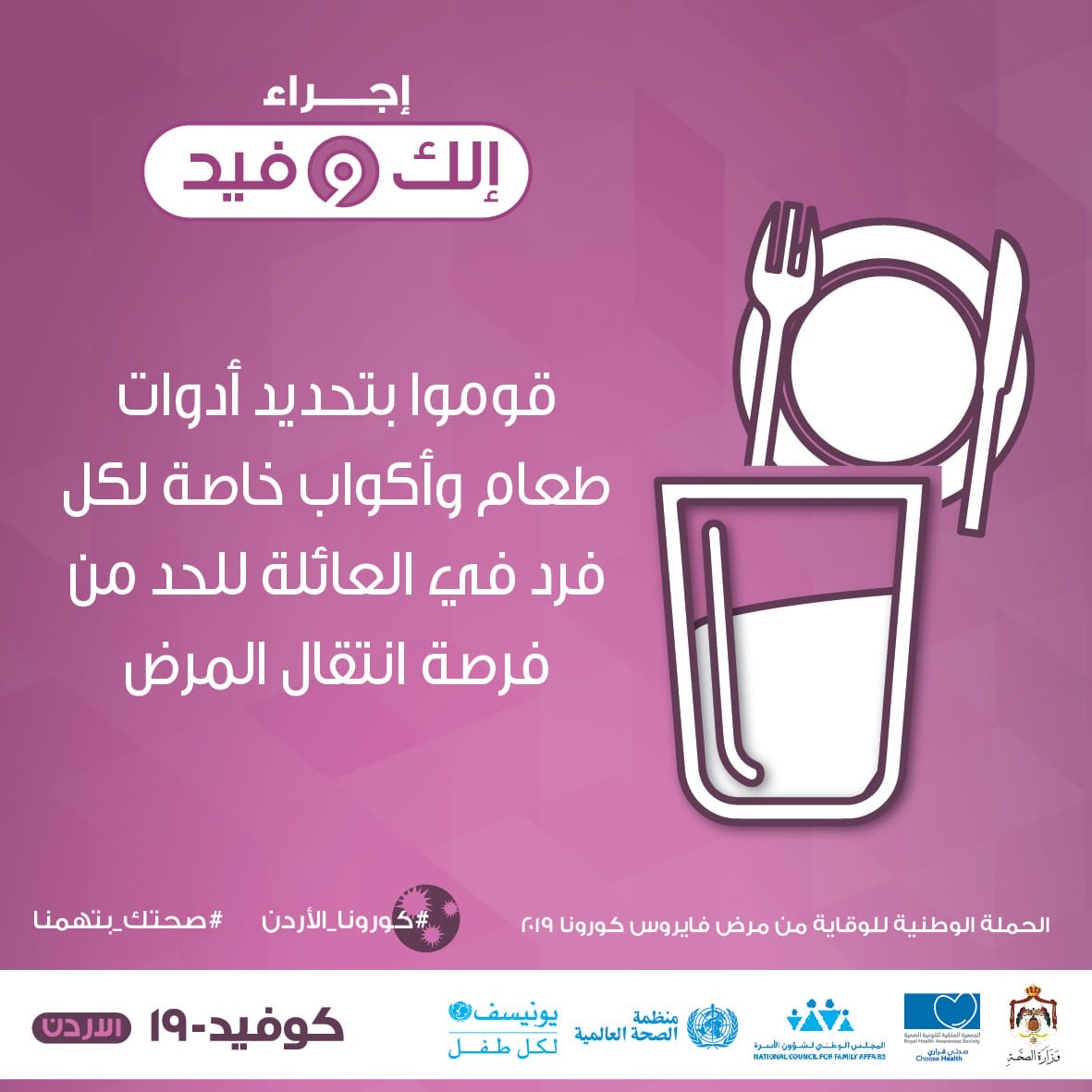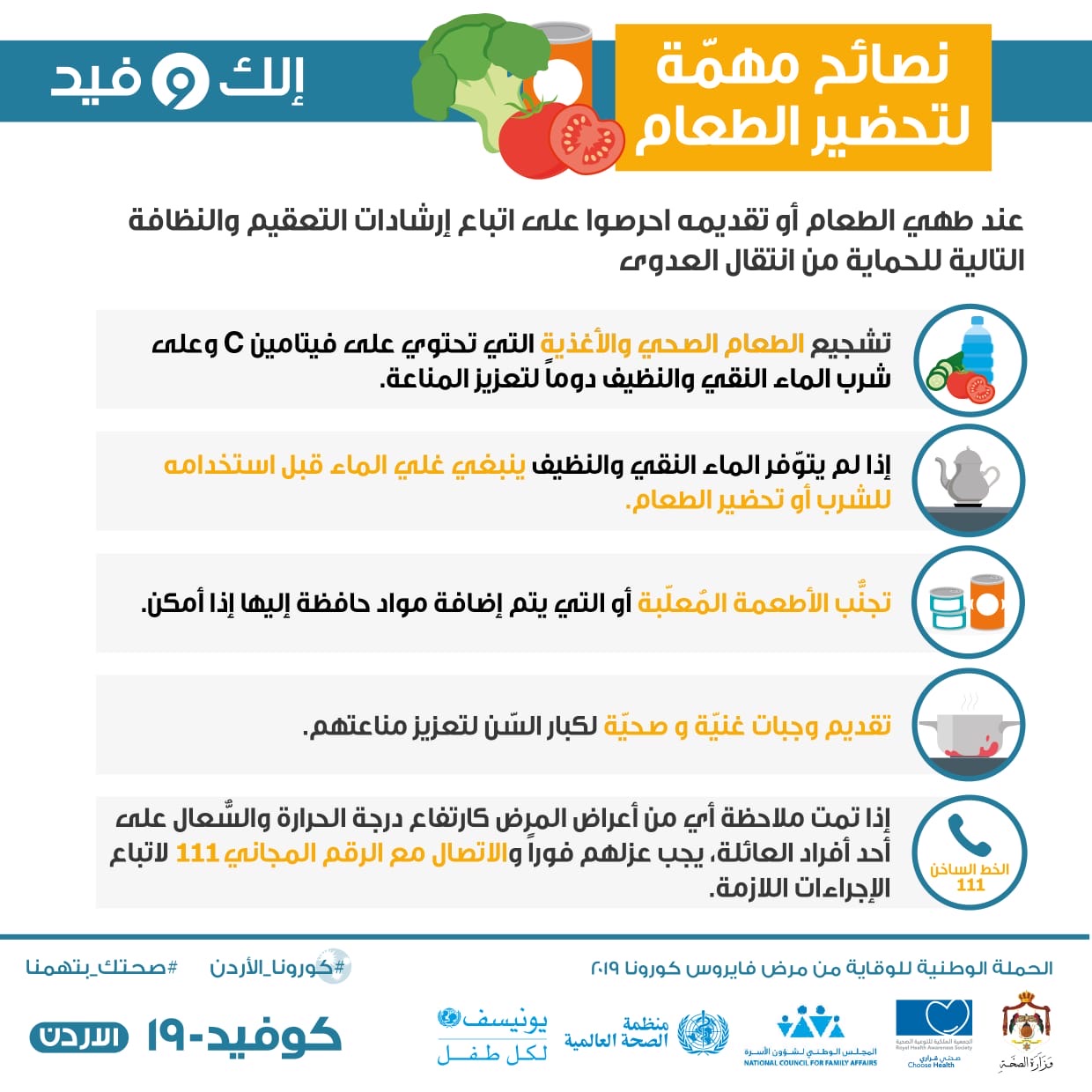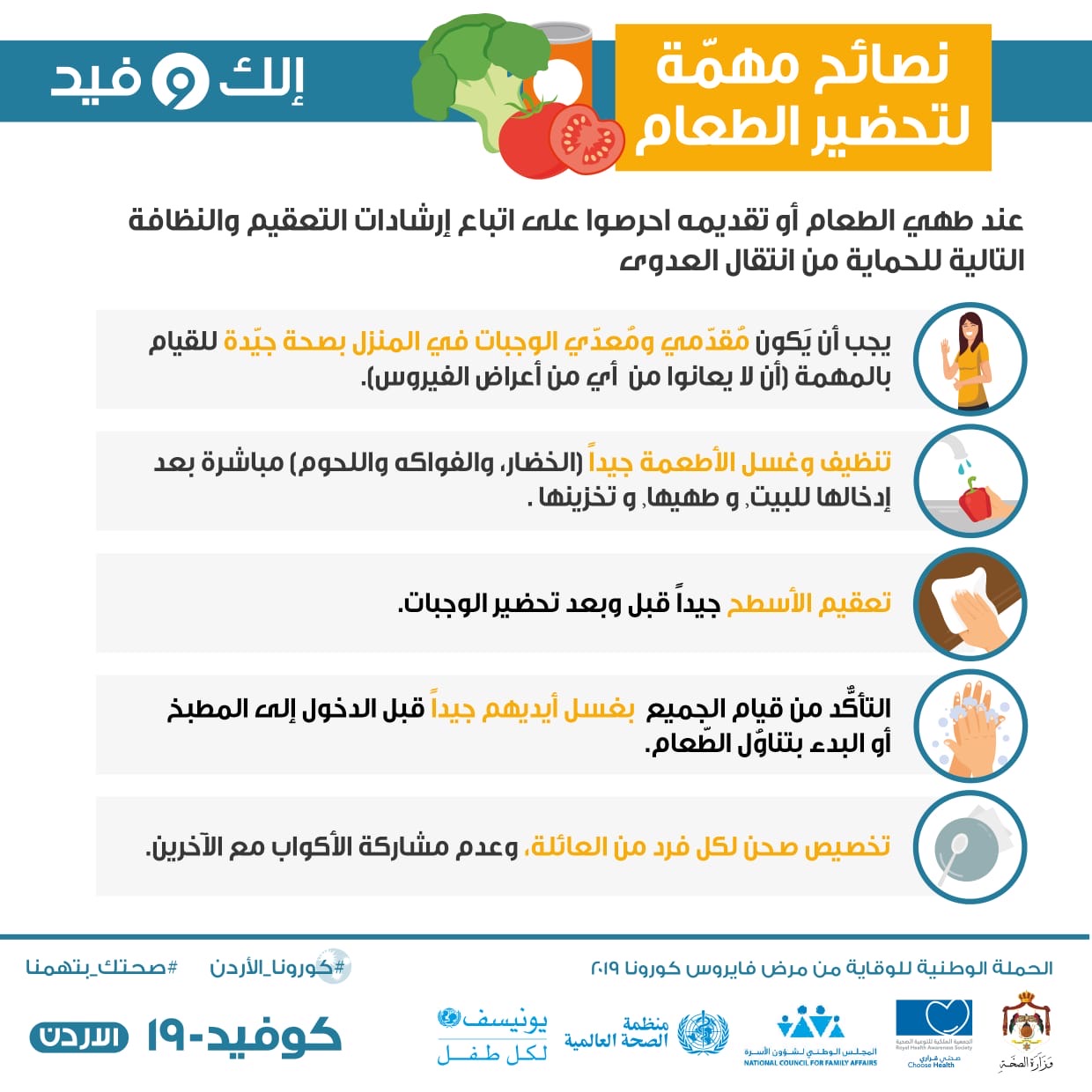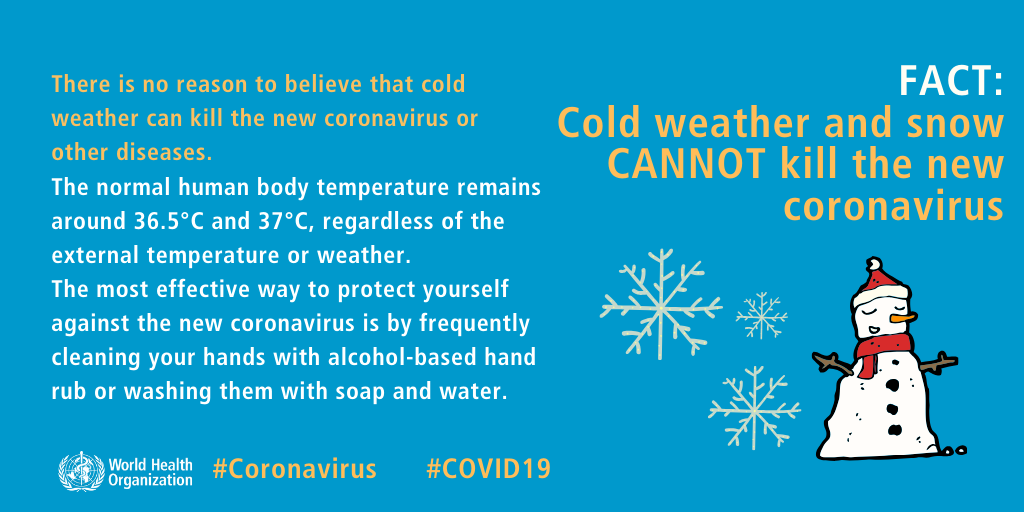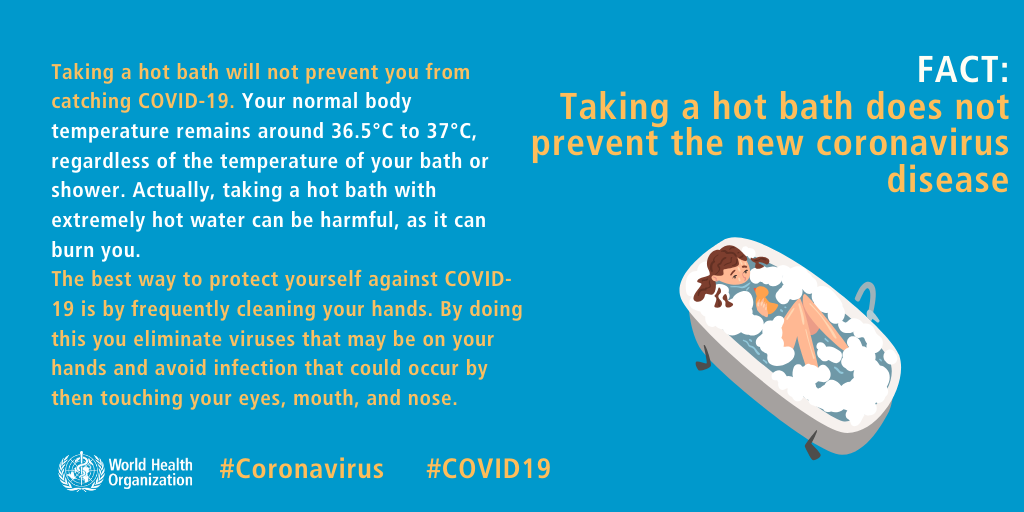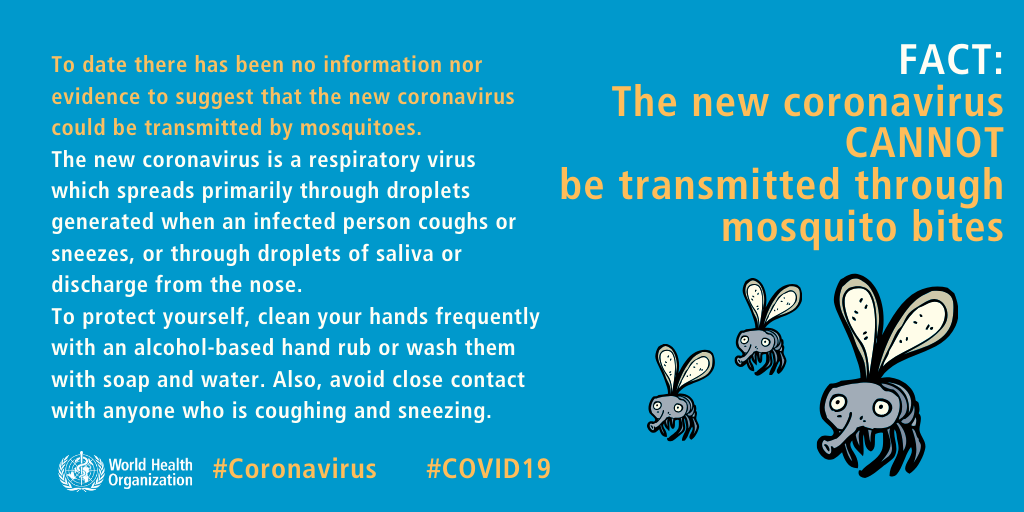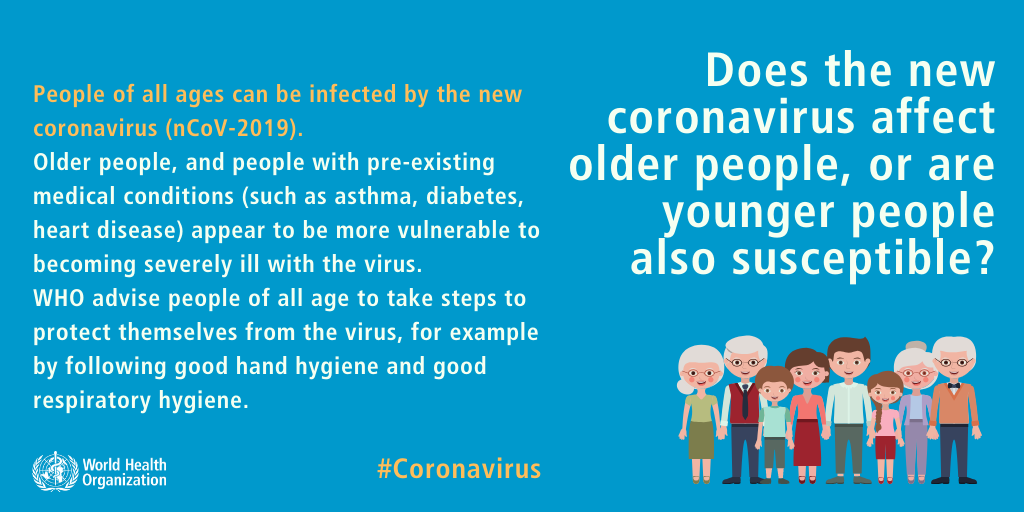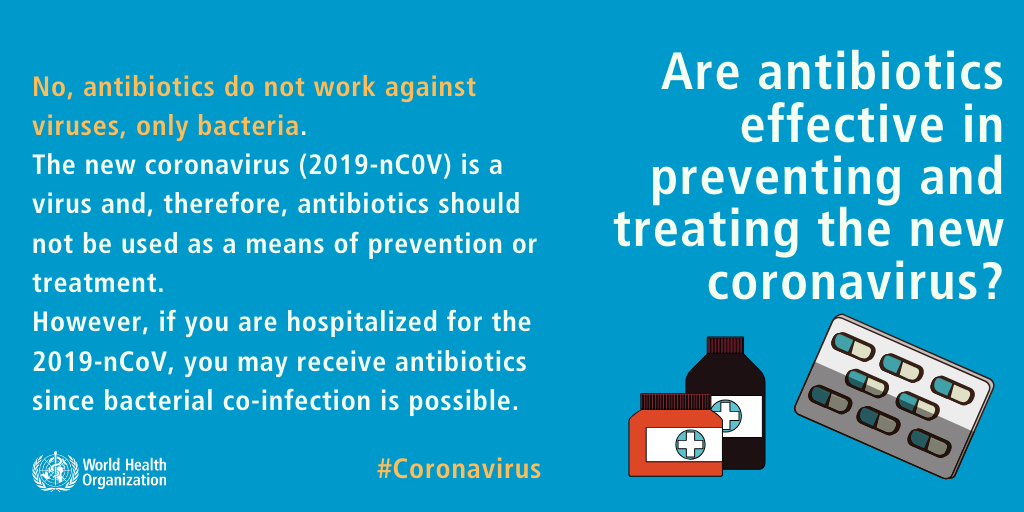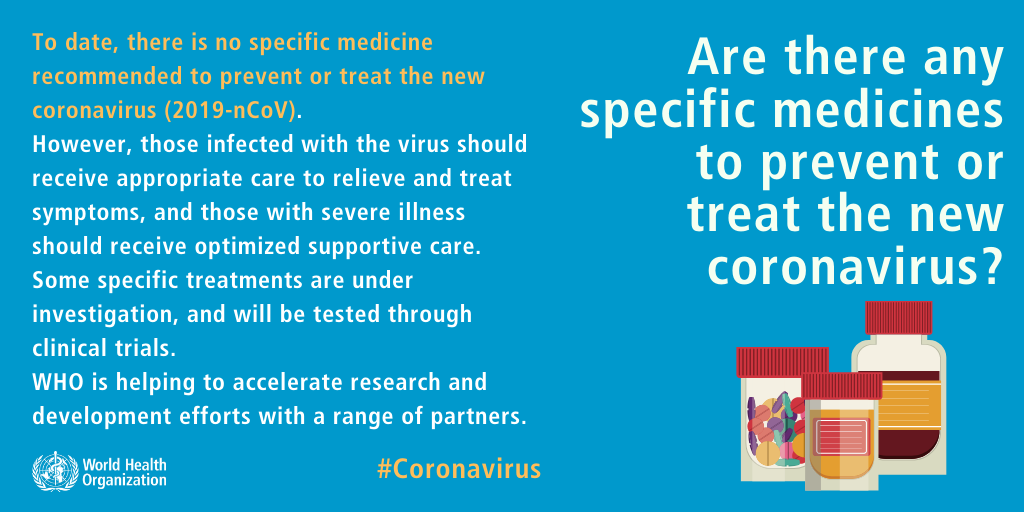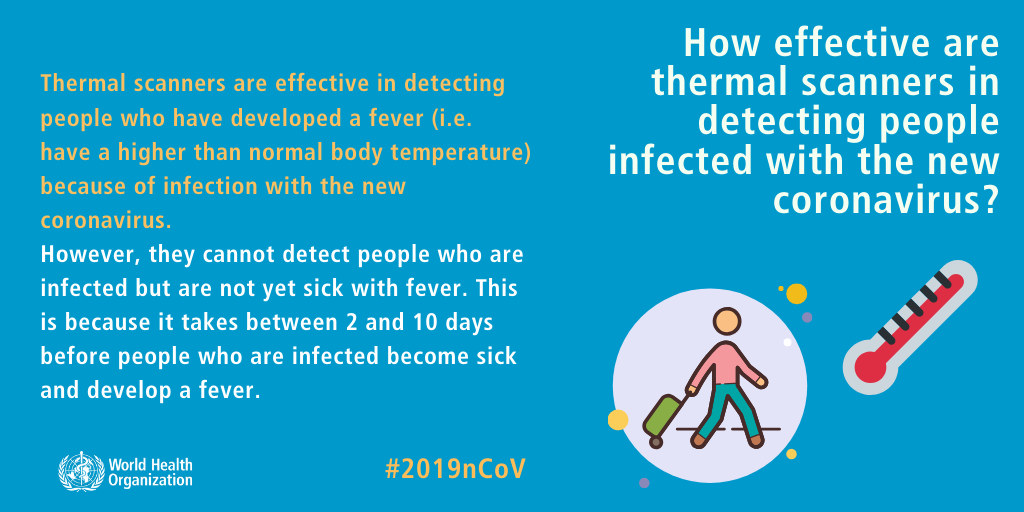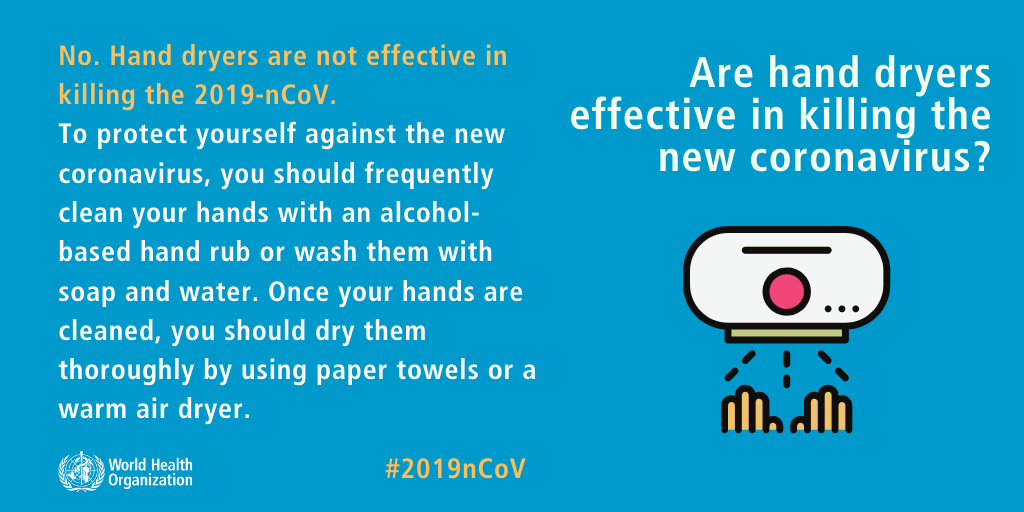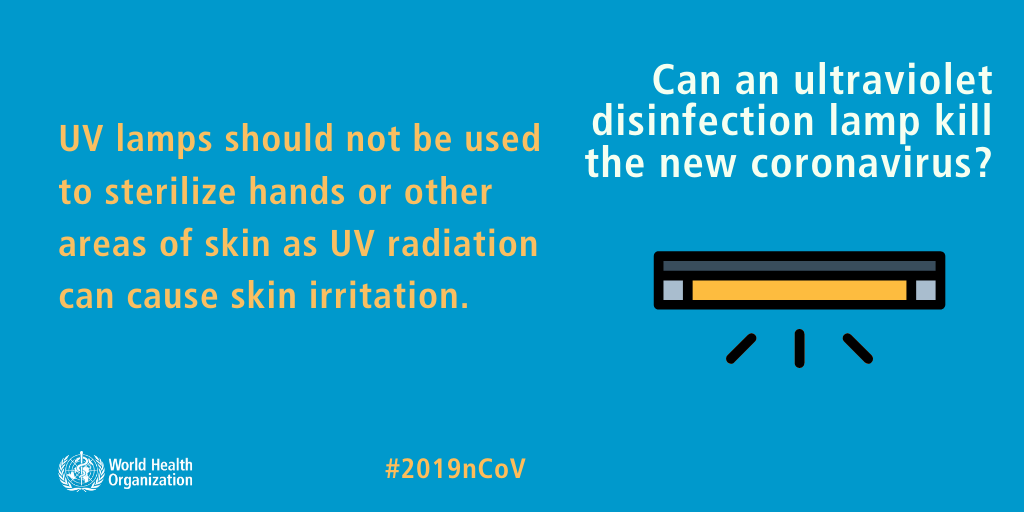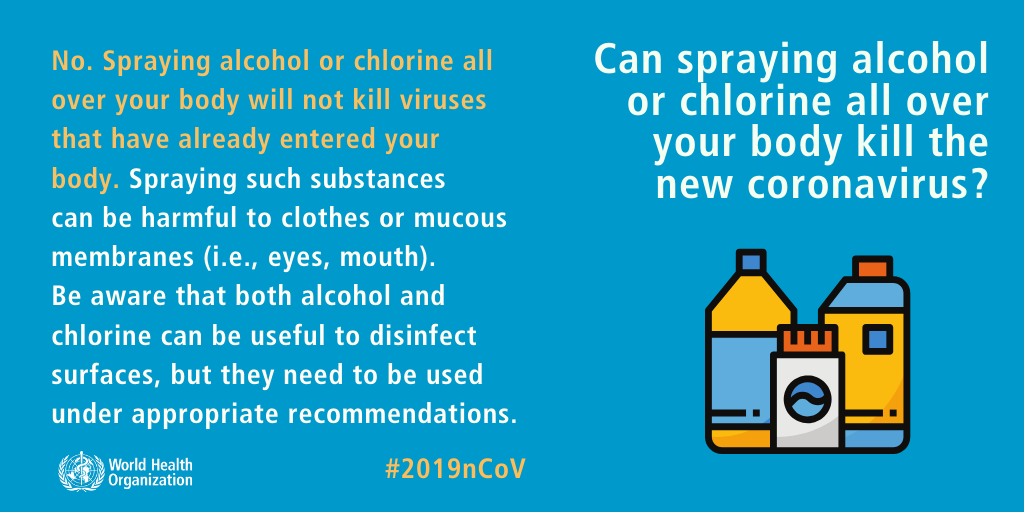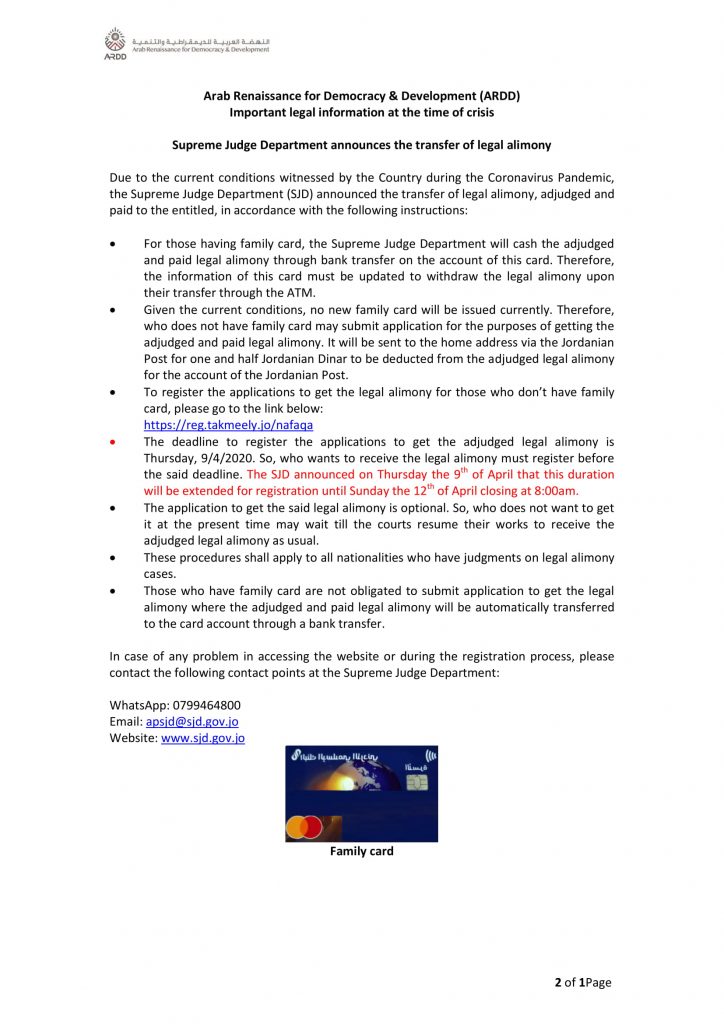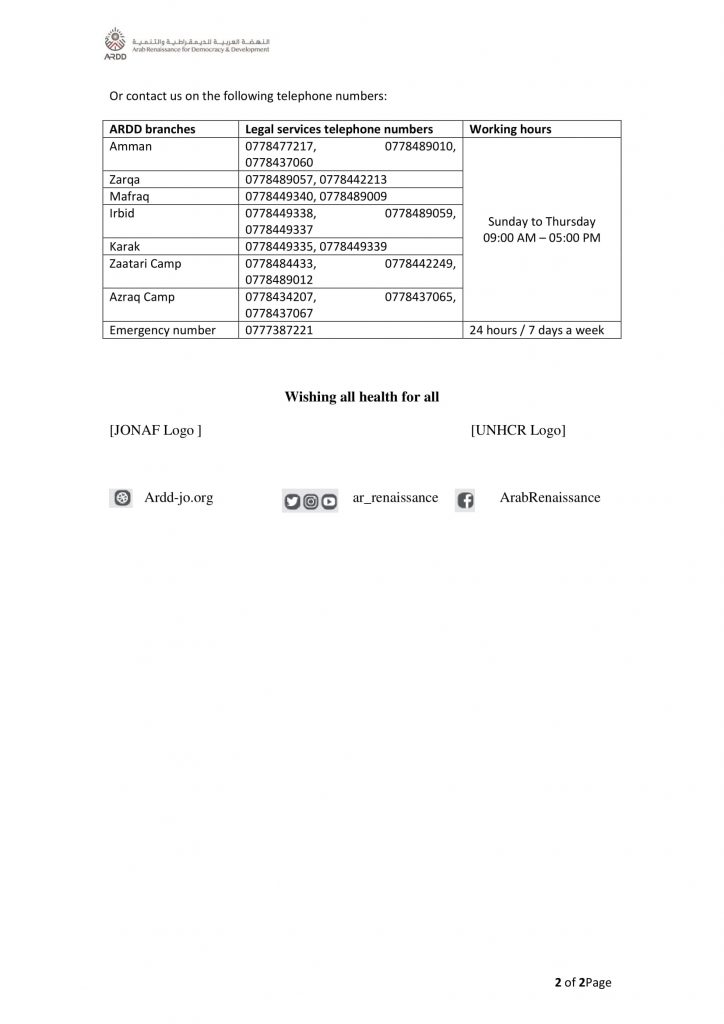Coronavirus (COVID-19) is spreading to an increasing number of countries. Common signs of infection include respiratory symptoms, fever, cough, shortness of breath and breathing difficulties. In more severe cases, infection can cause pneumonia, severe acute respiratory syndrome, kidney failure and even death.
To date, there is no specific treatment for this virus. However, many of the symptoms can be treated and therefore treatment is based on the patient’s clinical condition. Moreover, supportive care for infected persons can be highly effective. It is important to note that 80 percent of the cases of contagion experience mild fever and recover like a seasonal influenza. For a small percentage of cases, particularly those with immune-deficiencies and elderly/infirm, the impact can be more serious.Click here to go back to Welcome page.
Due to the current condition and to prevent the spread of epidemics, please note that, as of Saturday, 06 June 2020, 6AM, and until further notice:
- Curfew hours have been modified to become from 12PM (midnight) to 6AM daily – unless announced otherwise for specific days by the Government;
- Total curfew Fridays are lifted as of Friday 12 June 2020 – unless announced otherwise by the Government;
- Gradual reopening of certain sectors as announced by the Government
- Reopening of Mosques and Churches for the purpose of prayers at all times, taking into consideration the preventative measures in place to ensure safety for everyone;
- Schools and universities remain closed until further notice;
Anyone who violates the provisions of this defense order shall be subject to imprisonment for a period not exceeding one year.
UNHCR would like to remind you to maintain the safe practices as instructed in the general announcements with regards to COVID-19, and to act responsibly, keep practicing social distancing, and wear gloves and masks at all times. Relaxation of the rules does not mean the end of the crisis, nor does it mean that the virus has disappeared.
You are encouraged to take care of your health and that of others by following these tips:
- Avoid close contact with people suffering from acute respiratory infections;
- Wash your hands frequently, especially after direct contact with ill people or their environment. Wash hands with soap and water for at least 20 seconds. Use an alcohol-based hand sanitizer only if soap and water are not available;
- Stay home when you are sick;
- Avoid direct contact with animals and surfaces in contact with animals;
- Handle raw meat, milk or animal organs with care to avoid contamination of uncooked foods and avoid consuming raw or undercooked animal products;
- Do not travel when you are sick; you are likely to be quarantined and prevented from proceeding to your destination;
- Ensure you are up to date with recommended vaccines. Consider getting your annual influenza vaccine if you did not get it earlier.
If you are experiencing fever, cough and difficulty breathing and have recently travelled to or are a resident in an area where COVID-19 is reported, you should seek medical care immediately.
Face masks
Face masks: who should wear them? where should you wear them? and things to consider while using face masks to protect yourself during the corona virus outbreak in the posters below.
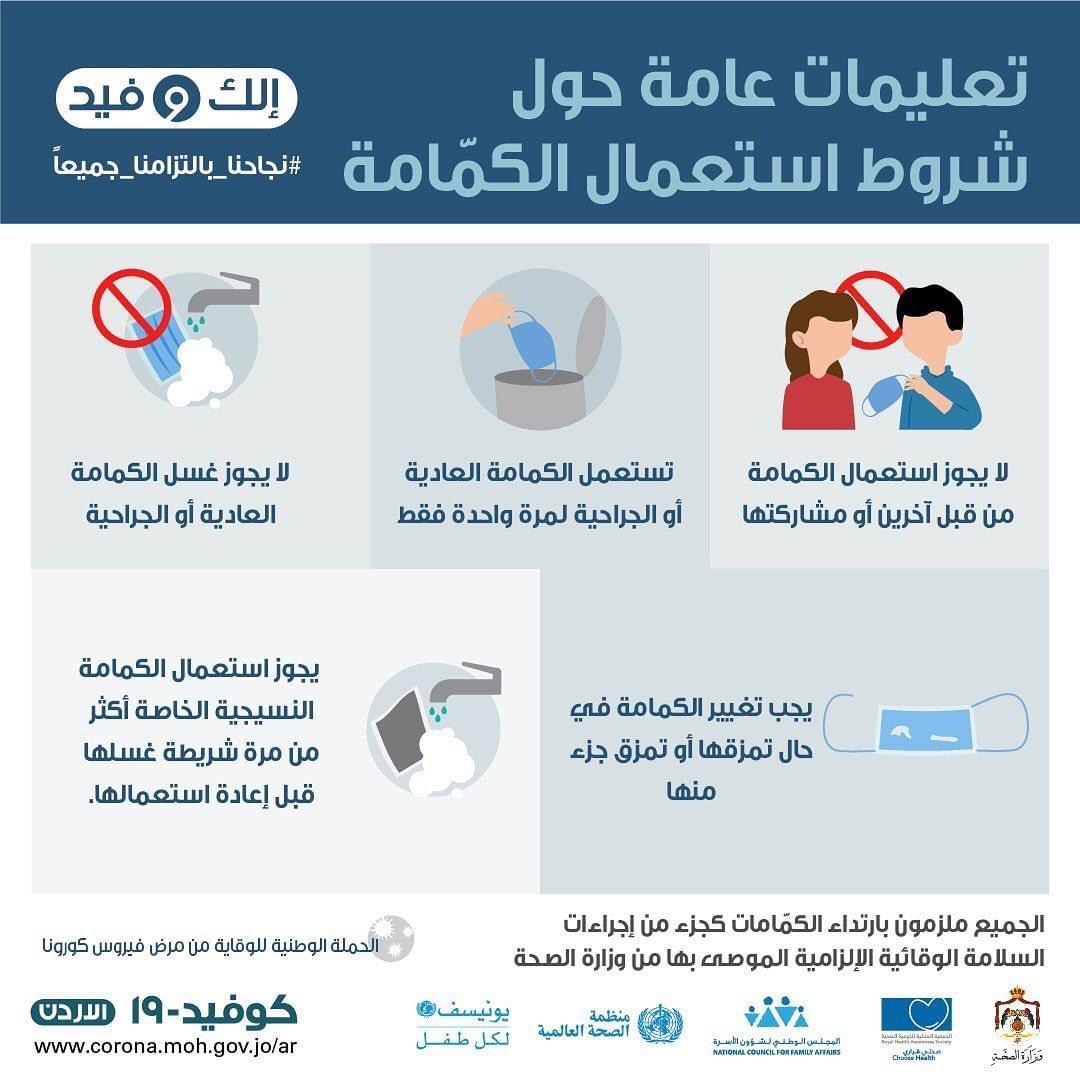
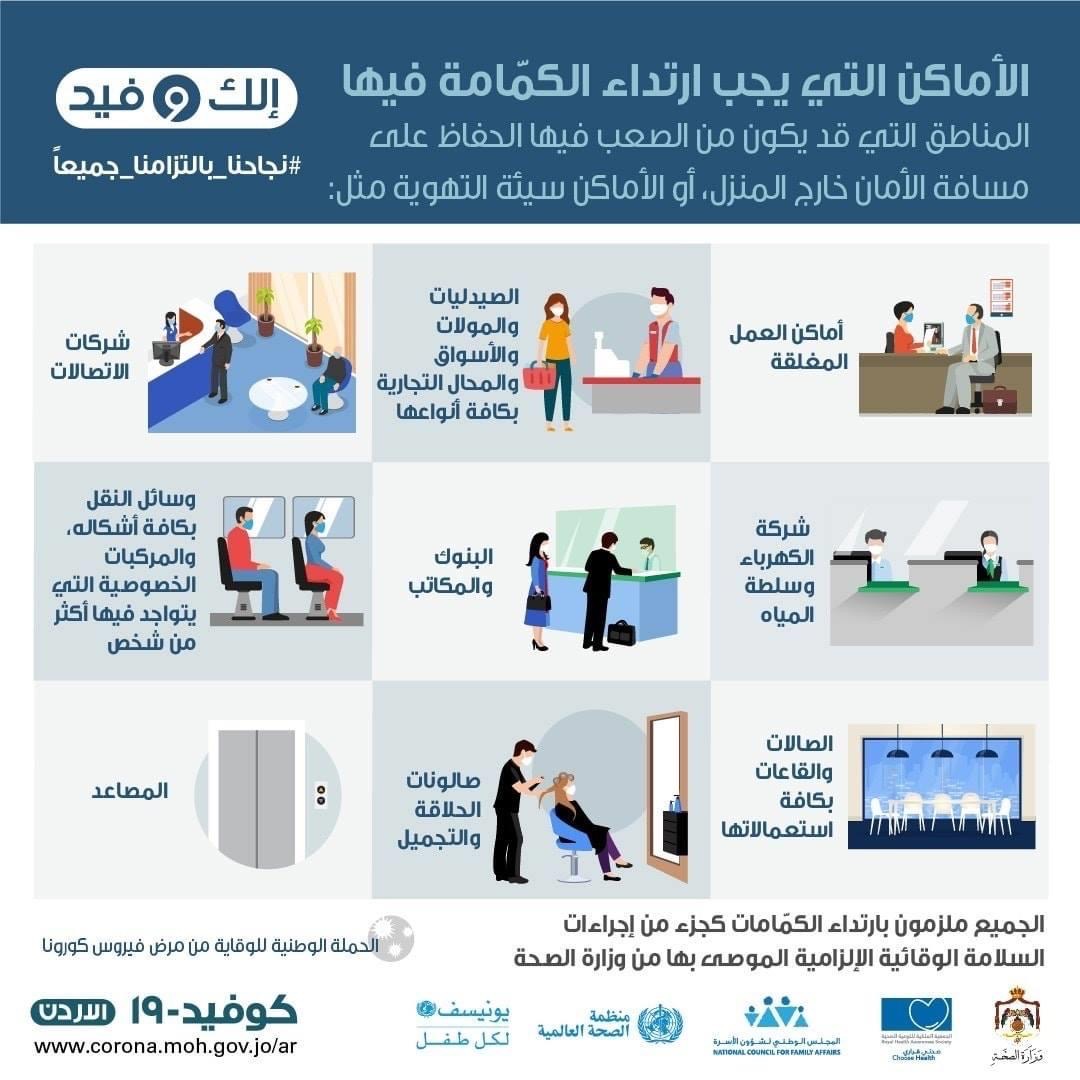

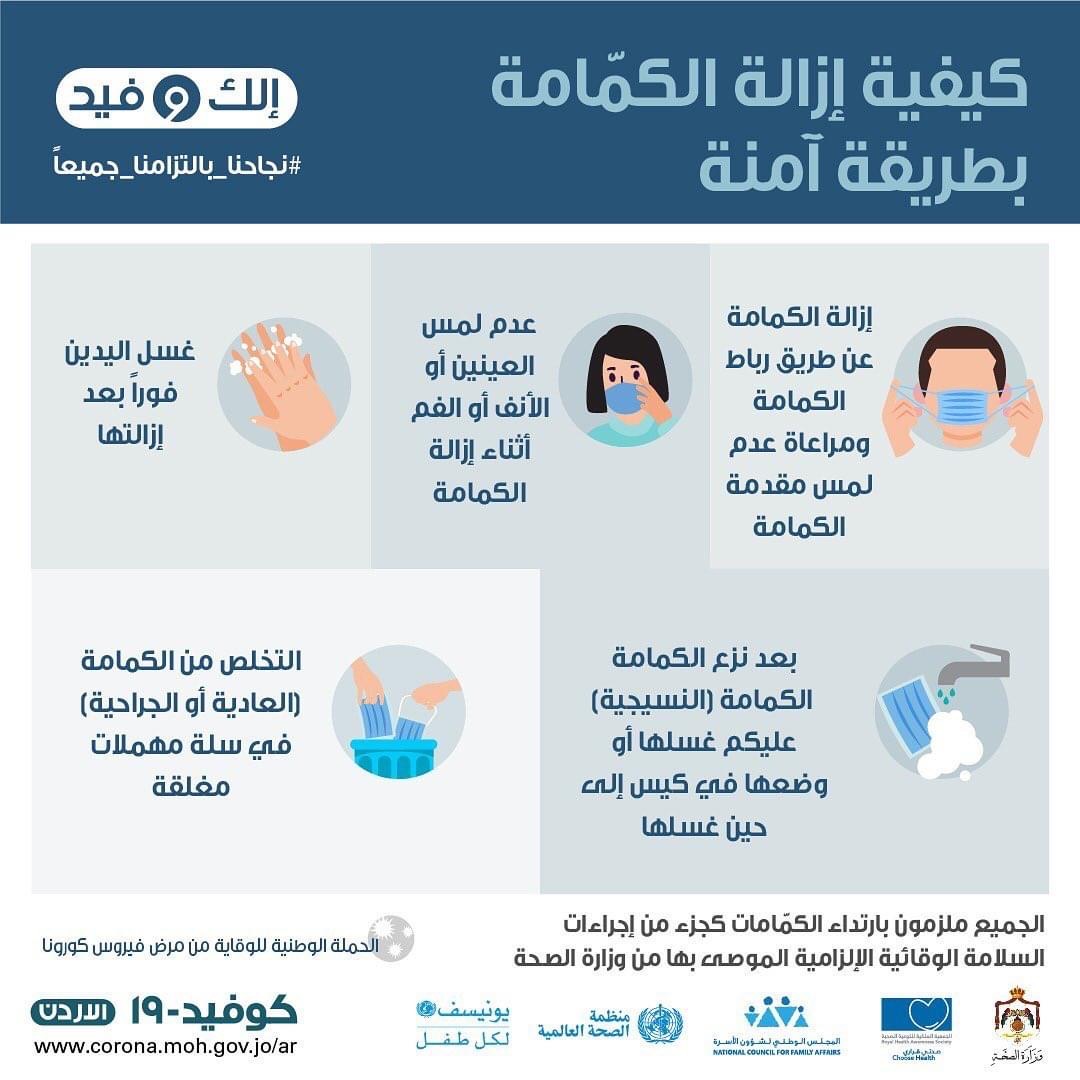
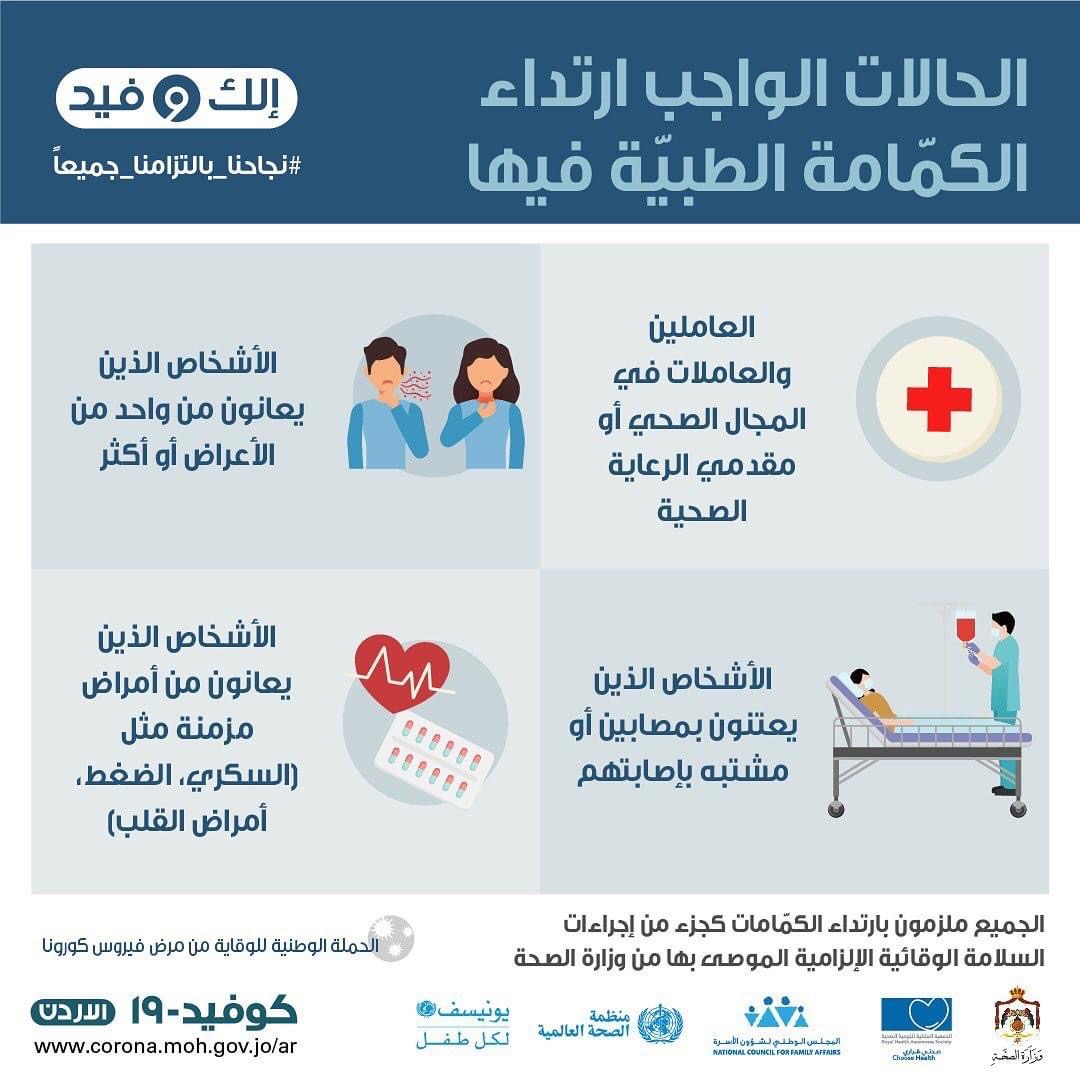

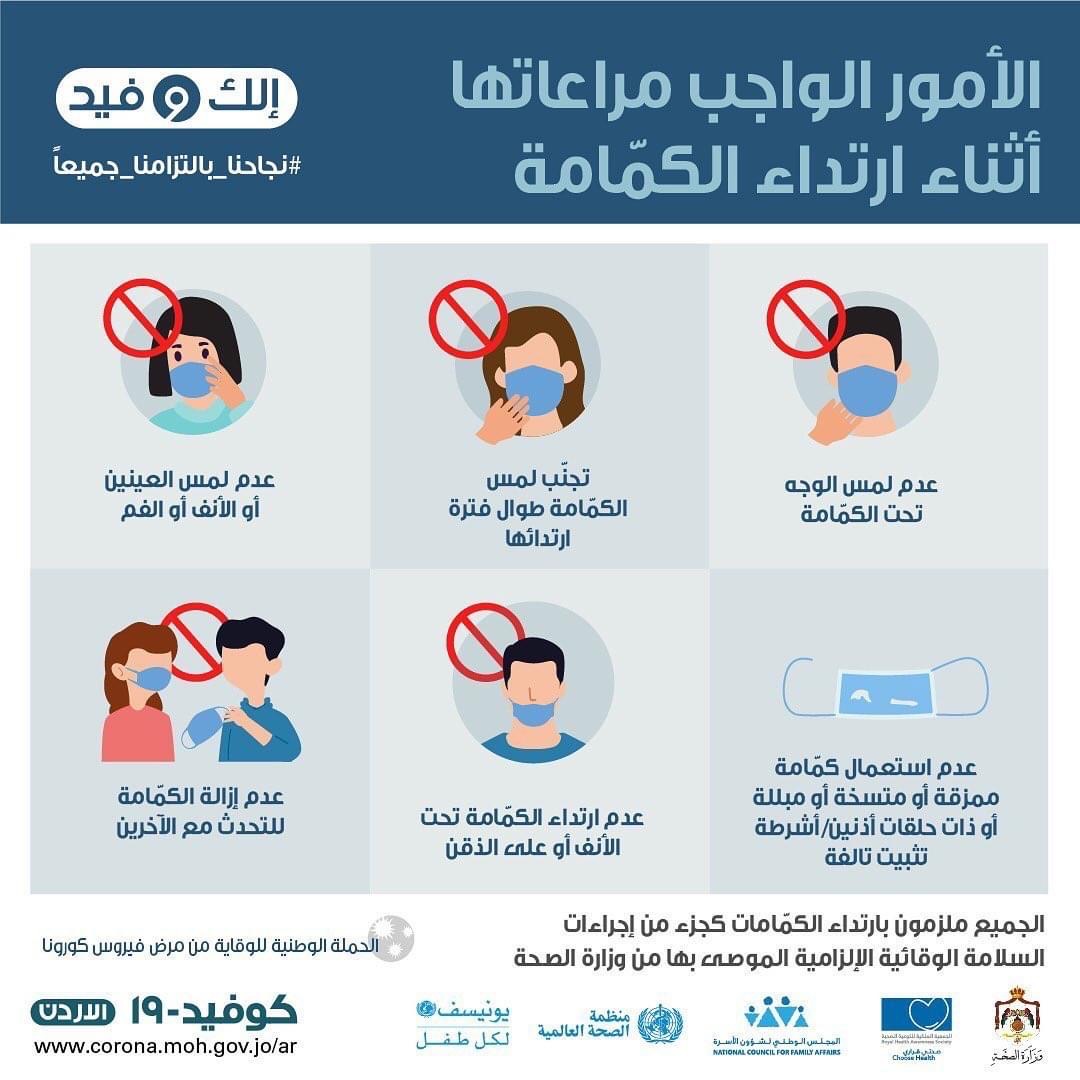
Tips - General
Tips - Food security
Myth Busters
Video
In line with the recommendations issued by the Government of Jordan, and for the protection of persons of concern to UNHCR and its staff, from Sunday 15 March 2020, and until further notice, UNHCR has temporarily suspended interviews with refugees at its registration centers (Amman, Irbid, Mafraq), and its activities in Community Support Centres to avoid putting its persons of concern and staff at any risk of infection. UNHCR follows instructions of the Ministry of Health and World Health Organization (WHO).
UNHCR Jordan is monitoring the situation and working closely with the Government of Jordan and World Health Organization to take the necessary measures to protect its Persons of Concern.
In order to avoid rumors and fake news, make sure that you receive your information from an official source. Follow UNHCR Jordan on Facebook and Twitter for constant updates. Should there be any further change to the working modality of Registration Centres, and activities UNHCR carries out at Community Support Centre, UNHCR will inform Persons of Concern.
Access to healthcare
For emergency medical cases life-threatening health emergencies, you must call the Civil Defense through their unified emergency hotline number 911, who will provide the best advice.
If you experience any symptoms or are in doubt of infection, you need to get in touch with either hotlines of the Ministry of Health (111) or (193) or the Civil Defense Unified Emergency Hotline (911). Please do not leave your home without getting in touch with either hotline to receive the appropriate guidance and counseling on how to seek help.
Available medical facilities in the response for COVID-19 are:
- Centre Governorates (Amman, Zarqaa, Balqaa, Madaba):
- Al Basheer Hospital
- Jordan University Hospital (Jubaiha)
- Zarqaa New Public Hospital (Zarqaa)
- South Governorates (Karak, Tafilah, Ma’an, Aqaba):
- Prince Hashem Military Hospital – Royal Medical Services (Aqaba)
- Karak Government Hospital (Karak)
- North Governorates (Irbid, Mafraq, Jerash, Ajloun):
- King Abdullah I University Hospital (Ramtha)
- Zaatari and Azraq Camps:
- Residents of Zaatari and Azraq Camps can seek the medical assistance of the local clinics in the camps. In cases of doubt or emergencies, you will be referred to the nearest centre from the above list.
For residents of the remaining Governorates and areas in Jordan (Ramtha, Ajloun, Jerash, Mafraq, Ruwaished, Azraq, Zarqaa, As-Salt, Madaba, Karak, Tafilah, Ma’an), you need to get in touch with either hotlines of the Ministry of Health (111) or (193) or the Civil Defense Unified Emergency Hotline (911). Please do not leave your home without getting in touch with either hotline to receive the appropriate guidance and counselling on how to seek help.
Legal assistance
For assistance in legal issues and detention, please call:
- UNHCR Detention Line: 0796742200
- ARDD Legal Aid Emergency Line: 0777387221
Both lines’ working hours are 24/7.
At this time, please also take note that the UNHCR Helpline (064008000) will only be operating through its interactive voice response system. We apologize for not being able to answer any calls.
For persons concerned with alimonies (Nafaqa), please see the below announcement:
Interviews
UNHCR has temporarily suspended interviews with refugees at its registration centres (Amman, Irbid, Mafraq), and its activities in Community Support Centres to avoid putting its persons of concern and staff at any risk of infection.
If you have a scheduled interview, it is postponed and UNHCR will get in touch with you to reschedule it once the situation is back to normal. Do not approach UNHCR Offices (Amman, Irbid or Mafraq) or Community Support Centres for any reason under the current circumstances.
Resettlement
The Government of Jordan has announced that all flights to and from the Kingdom are suspended as of Tuesday 17 March until further notice. As a result, all travel of refugees to resettlement countries will be postponed. Resettlement countries remain committed to receiving refugees who have been accepted for resettlement, and it is expected that travel will be rebooked in the future, when the situation allows.
If you have a travel booking for resettlement, and have a question about travel cancellation, you can call IOM on their hotline number 0798954077, from Sunday to Thursday, 11AM to 1PM.
From Sunday 15 March, and until further notice, UNHCR has temporarily suspended resettlement interviews for refugees at its office in Amman to avoid putting its persons of concern and staff at any risk of infection.
Remote education
You can find all the information needed on the remote education modalities by visiting this dedicated website.
You may also constantly check UNHCR and UNICEF on Facebook for additional resources.
Camps-Related
As of 15 March 2020, and until further notice, and for the protection of persons of concern to UNHCR, the following decisions have been made:
- All residents of both Zaatari and Azraq Camp holding work permits will be suspended from leaving the camps (i.e. for reasons of work – using their work permits);
- Similarly, leave permits for residents of both Zaatari and Azraq Camp will be suspended. Those who are currently on leave permit will be allowed to have access back into the camp upon return;
- Returns services will be suspended.
UNHCR Helpline
At this time, please take note that the UNHCR Helpline (064008000) will only be operating through its interactive voice response system. We apologize for not being able to answer any calls. Callers may leave a recorded message and someone will call back as soon as possible for follow up.
In order to avoid rumors and fake news, make sure that you receive your information from an official source. Follow UNHCR Jordan on Facebook and Twitter for constant updates.
Dispensing medication from Ministry of Health
Registered Syrian asylum seekers/refugees and beneficiaries of health care services provided by the Jordanian Ministry of Health (MoH) through health care centres all throughout the Kingdom’s directorates, those holding “health cards” for the purpose of receiving monthly medicines for chronic diseases, can contact the focal point in their respective locations from the list in order to coordinate the distribution of medicines, or go to the nearest MoH health care centre, according to the location.
You can find the lists through the following links:
Dispensing medication through Caritas
Registered asylum seekers/refugees suffering from chronic diseases such as hypertension and diabetes, from all nationalities, can dispense their medications through Caritas clinics, by contacting the focal point in their respective locations from the list in order to coordinate the distribution of medicines. They will need to confirm personal information, phone number and place of residence
The mechanism for distributing these drugs will be announced later.
UNHCR-run clinics - Caritas
UNHCR-run clinics operated by Caritas are now receiving applicants on an appointments’ basis only. Applicants must get in touch with the nearest clinic to their location from 9AM to 2:30PM in order to book an appointment, and that is in line with the precautionary and public health measures in place.
Please take into consideration:
- Committing to the date and time of your appointment to approach the clinic
- Not having any accompanying persons in the clinic to avoid crowdedness
- Getting in touch with the clinic through WhatsApp for cases of emergency hospital admissions and referrals
PS: to protect yourself, those around you and the community, you can install Aman.jo application for smart phones. This application notifies users if they happened to be around any diagnosed coronavirus patient or exposed to the virus, by tracking locations and calculating any overlap occurrences.
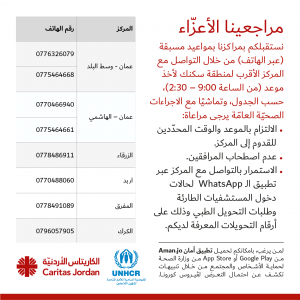
Child protection & sexual- and gender-based violence
UNHCR stands against any form of sexual and gender-based violence, which includes domestic violence as well as psychological abuse. Please note that UNHCR remains available to receive calls in this regard through the following numbers, all of which are operating 24 hours a day, 7 days a week:
- UNHCR Helpline: 064008000 – operating through Interactive Voice Response and by leaving a recorded message;
- UNHCR Irbid Hotline: 0796139584;
- UNHCR Mafraq Hotline: 0791420249;
- For residents of Zaatari Camp: 0791420242;
- For residents of Azraq Camp: 0797174852;
You can call these numbers to report any acts of violence or abuse against children or women, as well as gender-related protection issues. You may also access available services against violence at other agencies by downloading AMAALI application on the smart phone – available on Apple and Android.
Labour and work
UNHCR would like to remind you of the importance to protect yourself, by maintaining a safe space between you and others. If you any questions related to your labour/work, do not hesitate to contact ARDD’s emergency hotline 0777387221 or the Ministry of Labour’s complaints lines: 0796580666, 0785602666 and the free hotline 080022208.
Work procedures for safety and health protection measures to limit the spread of the COVID-19, by the Ministry of Labour can be found through this link.

